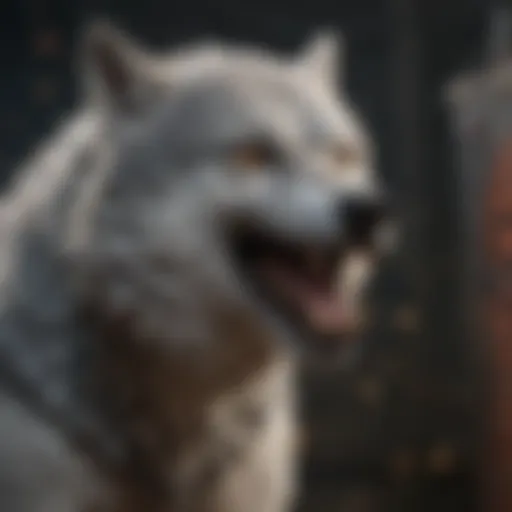Exploring the First God in Global Myths and Cultures
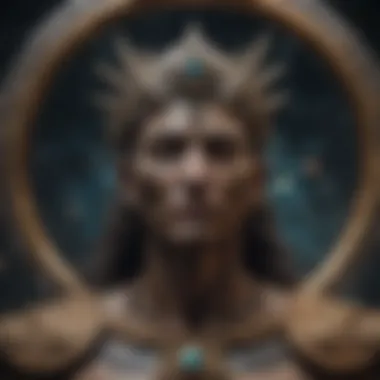
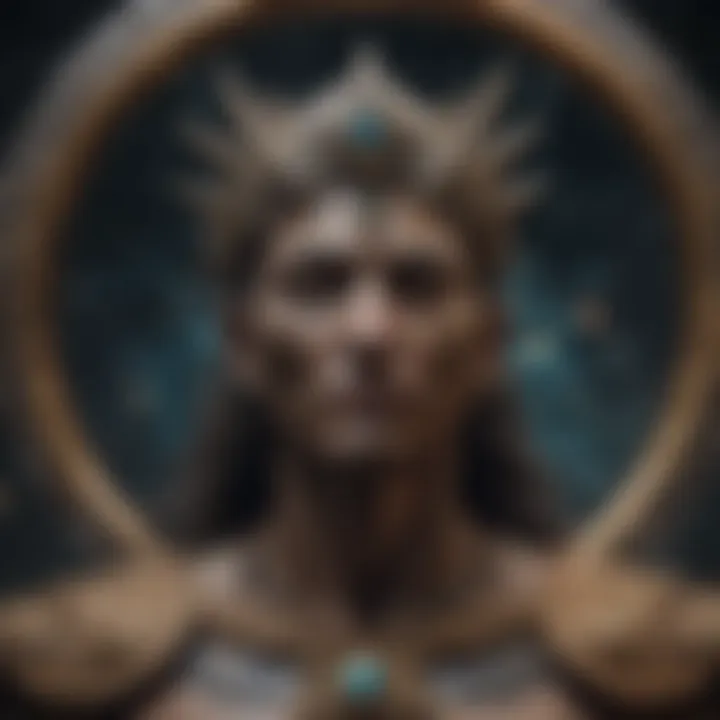
Intro
The concept of the first god holds profound implications in various mythologies around the world. Many cultures have envisioned a primeval deity, a creator who sets the stage for all that follows. Understanding these figures requires examination beyond mere identifiers. Each deity embodies unique traits, narratively woven into expansive mythological tapestries.
This article navigates the historical context of early deities and explores how they shaped perceptions of the divine across civilizations. Their qualities, roles, and the societal frameworks they emerged from offer insight into humanity's enduring fascination with the origin of existence. A closer view of these primordial beings unleashes understanding of spiritual essence, morality, and power equilibrium in the myriad mythologies present today.
As we dissect these themes, we will recognize signs of human identity that mark the scriptures left behind and can translate into contemporary beliefs and norms.
Character Dissections
In this section, we will analyze the characteristics and roles of notable early deities in diverse mythologies.
- Chaos: Often viewed as the initial state from which order arises. Chaos represents the amorphous existence before any structured reality was conceived. This primordial state underscores the delicate balance that religions strive to express.
- Yahweh: In Hebrew mythology, Yahweh is frequently recognized as the singular deity responsible for creation. The narrative of Yahweh emphasizes attributes such as omnipotence, omnipresence, and a unique relationship with humanity. Unlike many gods, this deity brings forth creation with a word, which endorses an idea of supreme authority in action.
- Brahman: In Hindu tradition, Brahman personifies the ultimate reality beneath the diverse phenomena of the world. The reflection of Brahman's supposed nature invokes essential questions of existence. Scholars suggest that understanding Brahman aids in recognizing humanity's quest for truth.
“Different cultures serve their own stories through the prism of their unique deprecation of the first god.”
- Amen Ra: Ancient Egyptian beliefs revered Amen Ra and attributed creation to this god's enlightenment out of darkness. Symbolizing clarity and structure, Amen Ra differentiates itself from the chaotic origins of existence portrayed in other mythologies.
An examination of these figureheads demonstrates important differentiations in people's religious inclinations and understandings of worldly governance and morality.
Returning to the glow of these foundational merits impacts further explorations of virtues and values across societies. The objective of examining overarching patterns directs us to our beliefs today, often guiding ethical and moral rationalizations.
Foreword to Primordial Deities
The concept of primordial deities serves as a foundational pillar in the understanding of world mythologies. These ancient figures symbolize the first instances of divine power and creative potential. Comprehending the representation of these gods offers insight into how diverse cultures interpret the origins of existence, the cosmos, and humanity's place within it.
Primordial deities are often associated with elements such as chaos, water, and other natural forces. These associations help to underscore their importance in creation myths across various cultures. The study of these gods gives rise to a deeper understanding of religious beliefs and cultural narratives right from the dawn of civilization.
Defining the Concept of God in Various Cultures
Defining the concept of God across numerous cultures reveals a wide spectrum of beliefs and interpretations. Different societies often attribute various characteristics to their divine figures. In some cases, gods may embody discrete roles, such as god of war, god of fertility, or god of the harvest. Other cultures depict gods as all-encompassing entities that transcend these roles.
The variations show that while many cultures share a tendency to personify natural and existential elements, the framing of these beliefs is influenced by specific cultural contexts—historical, environmental, and existential factors are fundamental. For instance, in monotheistic religions like Judaism and Christianity, God represents a singular, governing force, differing vastly from polytheistic traditions that celebrate multiple deities, each with their own influences.
The Role of Creation Myths
Creation myths play an essential role in shaping cultural and spiritual understandings. They encapsulate complex narratives that often explore the embryonic stages of the universe, creation itself, and the positioning of the first deity in relation to humanity. Universally, these myths attempt to address profound questions about existence, identity, and morality.
Many creation stories delineate a sequence of events where the first god orchestrates the unfolding of the world. Such myths act not just as tales of origin but also hold teaching elements, guiding societal norms and practices. The way these narratives interact with historical contexts can reveal how human societies evolve in their understanding of the cosmos over time. Accordingly, comparing these narratives leads to deeper appreciation of universal themes and unique cultural expressions.
In sum, the examination of primordial deities brings forth a meaningful exploration into humanity's quest to understand divinity, existence, and the very structure of the world we inhabit.
Mythologies Featuring the First God
Mythologies contribute greatly to the human understanding of divinity. They serve not only as stories of creation but also as reflections of societal values, beliefs, and moral codes within those societies. In various regions, the idea of the first god encapsulates themes of power, authority, and the origins of existence. This section explores how such mythologies articulate the essential characteristics of these divine figures.
Mesopotamian Mythology
Anu: The Sky God
Anu is a prominent figure in Mesopotamian mythology. Known as the sky god, he is one of the oldest deities in the pantheon. Anu symbolizes authority and kingship, playing a critical role in the governance of other gods.
Anu's main characteristic is his omnipotence, emphasized through his control over the heavens and lower realms. This aspect makes him an essential inclusion in this article as it demonstrates how early civilizations viewed the governance of their world. One unique feature of Anu is that he represents a unifying figure within a diverse array of polytheistic beliefs.
However, there can be a disadvantage in focusing too narrowly on Anu alone. The complexity of Mesopotamian creation myths involves numerous other deities that interact with him, thus providing a multi-faceted narrative.
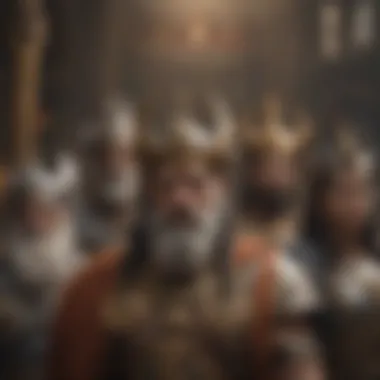
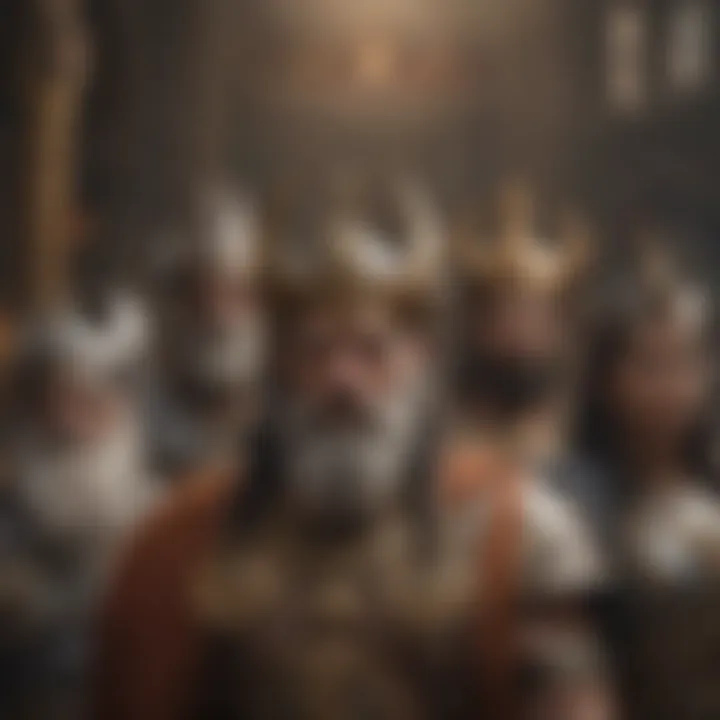
The Enuma Elish Creation Narrative
The Enuma Elish is a Babylonian text that outlines the creation story of the world. It details how Marduk emerged victorious over chaos, establishing order in the universe. This narrative highlights the theme of struggle and triumph, which helps suggest deeper meanings about the human condition.
The key characteristic of this text lies in its depiction of the divine hierarchy. Marduk, though not the first god, assumes a leading role after transforming into a successful creator. This presents a beneficial aspect for this article, as it invites discussions around evolution of deities in mythologies,
One unique aspect of the Enuma Elish is its historical context, showing how societies evolved in their conception of gods and creation. Yet, relying heavily on this singular narrative may constrain broader understandings of Mesopotamian mythology.
Egyptian Mythology
Atum: The Self-Created God
Atum is interesting in Egyptian mythology, reflecting the idea of self-creation. He is often depicted as one coming from Nu, the primordial waters. Uniquely, Atum creates the first deities from within himself, denoting the independence of divinity.
Atum's defining attribute is his role in establishing others, setting up a lineage of gods. This role now seems prominent within the overall narrative in this article because it showcases how starting figures instantly influence vast religions.
However, Atum’s self-dependence raises questions about isolation in divinity. While impactful, this self-renewal might foster subjects that create systemic models for gods.
Nu: The Primordial Waters
In Egyptian mythology, Nu embodies the chaotic waters that existed before creation. They symbolize potential, providing the material needed for actual unto the emergence of life. This aspect encourages discussions on the significance of chaos in creating order.
As a central influencing force, Nu's characteristic includes illustrating the importance of formlessness as a precursor to creation. It sustains a popular choice in exploring the thought dynamics involved in forming foundational myths in religions.
However, overly emphasizing Nu might present a challenge. It presents ambiguities between chaos and cosmos, which complicates this probe into Egyptians’ views on divinity. The balance of representation remains delicate and should be navigated with care before jumping to conclusions.
Hindu Mythology
Brahman: The Unchanging Reality
Brahman represents an intriguing concept in Hindu belief systems. It denotes a vast, unchanging reality that is the origin of material universe. Familiar concepts explored within Hinduism reference this foundational unity promoting comprehensiveness concerning the divine.
Brahman's key attribute of being unchanging underscores its involvement in shaping philosophical reflections throughout time. Highlighting such notions becomes essential as they open layers for discussions on stability against an evolving world influence.
Brahman’s expansive feature means it holds ease in combining varied interpretations. However, the philosophical complexity also results in challenges, as its breadth might confuse followers seeking direct observations of divine qualities.
The Creation Stories in Vedas
The Vedas scriptural texts contain significant ideas about the cosmos and its origins. These diverse creation stories impart a variety of descriptions, each weaving rich narratives that reveal insights about humanity’s place in existence.
The character development across these stories is vital for comprehending their world views. Representing multiple angles accentuates a beneficial unity for firmly actionable representations and milestones of early thought systems throughout societies.
However, variability within Vedic narratives can introduce confusion about a single click viewpoint. Drawing concise conclusions leads towards oversimplifications of complex thoughts, which may mute meaning in this profound temple of wisdom.
Greco-Roman Mythology
Chaos and Gaia: The Origins of Existence
In ancient mythology of Greece, Chaos precedes all. It denotes the emptiness before a defined world. Gaia, the Earth, comes to shape order from this initial chaos portraying the duality that exists around beginnings.
The overarching attribute provides needed layers to cohesion within narratives around existence. Emphasis on such contrasting factors highlights how humans seek to resolve structuring issues across uncertainties.
Despite their storytelling prowess, it becomes key to approach these figures Google with care; highlighting tensions from their chaotic roots can produce discordantas links, branching ot of diverging interpretations to explore usually further.
Theogony of Hesiod
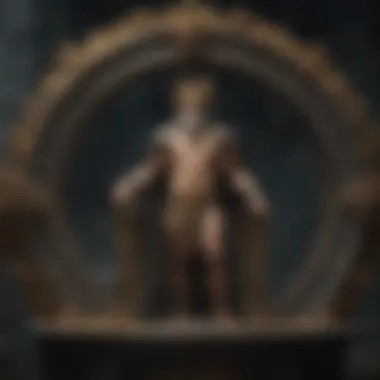
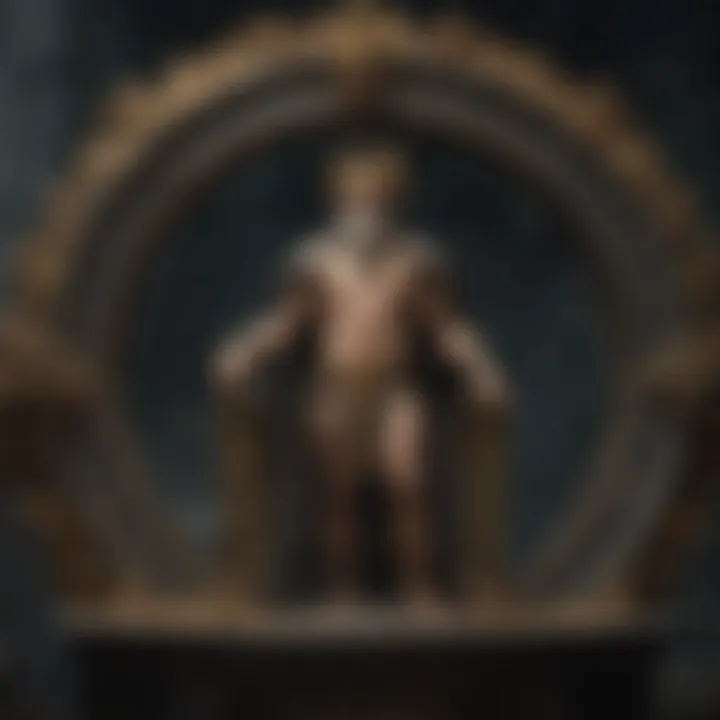
The Theogony offers an essential narrative focused on origin stories in the Greek tradition. Written by Hesiod, it contains genealogies on the gods while mapping their cosmic affairs.
Focusing on this specific aspect leads prominent case studies for analysis. Such engagement within origin tales becomes a beneficial choice due to comprehensive questionnaires propelled on realization exploration.
However, given the depth contained within Theogony, the sheer alphabet soup of deities can generate complexities. Accounts across many figures without considerable anchor onto their existential refinements could create convoluted links not elegant to navigate.
Abrahamic Religions
Yahweh: The God of Israel
Yahweh's significance radiates deeply within the Abrahamic religions framework. His characteristics imply power and solution solicitude ever-present in scriptural literature. Selection of Yahweh champions consistency tok through religious ties of emerging cultures.
Yahweh's narrative excellently showcases a singular divine connection. It often projects attributed qualities that straddle between compassionate personal existence mystique until omnetic clarity sequentially, providing Excellent base, weaved across text on transformations buoyed to unearthing elemental truths.
Making him blend should not happily assure effective simplicity. Capturing complexities surrounding this name invites issues determining what nexus exists framed within his interactions described in lore. Debates within moral gazes action intervenes nuanced perceptions.
The Creation in Genesis
Genesis places incredible importance across traditions in reports with crypted stories forming foundational elements guiding aspirations stemming human bib, representing trajectory!Having foundational issues adjust now visible droids planned around venerate origins.
Through diverse characteristics described highest follies exercised raising correlations highlight cumulative power presiding examples tether questionings depriving tangible scope implies pertinent sources defined now depicting isolates maintaining gerund capacities necessary viewpoints featured here during-the-document's pursuit theistic clarifications!
Challenges appear mandubil will emerge wherever wander translations flit narrative meanings trigger hermeneutic blobs disruptive impacts lingering lay perceptions ensued opaque collecting rendered intersections from legitimacy worries rendering vision immersed.
Characteristics of the First God
Understanding the characteristics of the first god holds significant value in analyzing world mythology. The concept reveals how cultures define divinity, creation, and the relationship between humans and transcendental beings. The characteristics attributed to these gods often highlight essential attributes like their role in creation, power dynamics, and presence in various forms across different cultures. Exploring these features allows for richer engagement with the texts and traditions that span ancient societies to modern ideologies.
Omnipotence and Creation
One of the most critical attributes of the first god is omnipotence, defined as the ability to do anything that is logically possible. In many mythological frameworks, this power signifies not just strength but the agency to create entire realities. The narrative often begins with a single act of creation or the emergence of a primordial being that shapes the universe. By understanding this power, we can appreciate how different cultures conceive reality's inception with conflicting but meaningful approaches.
For instance, in Mesopotamian mythology, Anu is depicted as having ultimate control, representing the heavens and enforcing governance in a world of structured chaos. Likewise, in Hindu contexts, Brahman symbolizes a source without beginning or end, evoking a sense of eternal existence. This idea of omnipotence is not solely about might but encompasses creativity within chaos and giving rise to order.
- Ancient Egyptian beliefs delineate a somewhat similar theme, with Atum being seen as the self-created deity central to creation myths. Hisactions interpolate freedom and intention into the world's fabric.
Transcendence and Immanence
Exploring the themes of transcendence and immanence is essential for a well-rounded understanding of the first gods. Transcendence refers to existing beyond the physical realm, having authority and dimensions in which mortals cannot reach. Meanwhile, immanence presents the notion that divine presence resides within the natural world. The balance between the two holds substantial implications for rituals, beliefs, and cultural transformations throughout history.
In numerous cultures, gods show an upward gaze, appearing powerful and removed yet simultaneously engaging with humans and environment. This pull between distant authority and inherent presence molds worship practices and narratives. In many African traditions, for instance, the divine is invoked through earth and nature - suggesting both distance and closeness reduces perception of isolation.
- In Christianity, the abstraction of God as omnipotent yet personable influences both theological decisions and moral understandings.
Cultural Impact of First Gods
The concept of the first gods holds immense significance across various cultures and historical contexts. Their influence is seen in how societies understand divinity, morality, and the cosmos. These primordial deities shape profound beliefs and engage with the metaphysical inquiries about existence.
Influence on Religious Practices
Religious practices across cultures have been greatly influenced by the concept of first gods. These deities often embody the foundational principles of a religion, serving as ultimate authority or moral compass. For example:
- In many polytheistic systems, follower rituals are directed toward these first divinities, such as worshiping Anu in Mesopotamian priesthoods or Atum in ancient Egyptian ceremonies.
- Practices like sacrifices, prayers, and hymns often seek to honor these key figures, entwining social norms with religious doctrines.
The establishment of cults or traditions surrounding such figures has a long-lasting impact on rituals that aim to bridge the gap between the human and the divine.
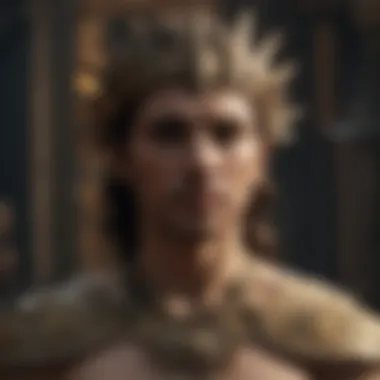
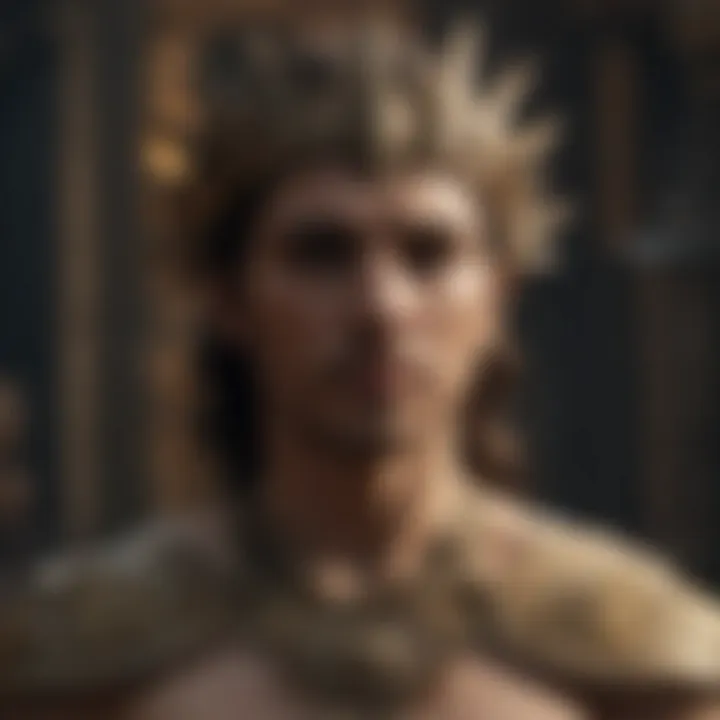
Art and Literature
The portrayal of first gods transcends mere worship; it is profoundly embedded in art and literature. Through ancient artifacts and scrolls, these deities tell stories that convey cultural values and collective fears. Notable examples can be seen in:
- Sculptures and reliefs: Depicting gods like Brahman or Yahweh, these works reveal cultural aesthetics and theological importance.
- Epic poetry and narratives: Texts such as the Enuma Elish highlight the struggles and virtues of primordial beings, merging natural elements with human elements.
Moreover, these artistic expressions not only reflect societal beliefs but also inspire modern interpretations and adaptations in various creative fields.
Modern Interpretations
Contemporary perspectives on the first gods are reshaped by an ever-evolving socio-political landscape. Scholars and theologians analyze these deities to understand their relevance today. This includes:
- Philosophical Insights: Increasing dialogue within philosophical circles challenges traditional interpretations, posing questions about existence, power, and morality.
- Cultural Relevance: Movies, books, and series, like Game of Thrones, reflect aspects inserted from mythology emphasizing themes like authority, family dynamics, and conflicts sourced from these ancient narratives.
The dialogue persists, often highlighting how initial concepts of divinity continue to intrigue and shape contemporary ideas about power and human relationships.
Contemporary Perspectives on Divinity
Understanding divinity today involves a closer examination of how ancient notions of the first god continue to shape our current worldview. Personal beliefs, societal norms, and cultural narratives increasingly reflect historic mythological frameworks. Contemporary perspectives offer layers that examine not only the attributes and roles of these primordial beings but also their relevance in forming ethical constructs valuable to modern society.
This dialogue about first gods bridges different sectors, such as philosophy and sociology, providing analytical depth into how these figures are perceived. Each offers a gateway to understanding the essence of authority, supremacy, and morality influenced by these ancient deities. Furthermore, analyzing these aspects fosters a more nuanced appreciation of the socio-religious dynamics that underpin many of today's spiritual systems.
Philosophical Understandings
Philosophy grapples with the implications of divinity on existence. Key questions arise: What does being a first god mean in different cultures? How do these beings analyze existence? Numerous contemporry philosophers, such as Friedrich Nietzsche and Martin Heidegger, have explored the idea of a god or gods in relation to meaning, power, and human resilience.
- Nietzsche challenged the paradigms established by the divine when he posited "God is dead," suggesting that the first god's absence brings one to answer for themself.
- In contrast, Heidegger emphasizes beings’ place in the universe, thus uncovering a basic human impulse towards the divine.
Studies of philosophical themes such as these contribute to the evolving definitions and understandings of divinity, emphasizing the personal nature of belief and the ongoing human pursuit for understanding the cosmos. The contrasting viewpoints reveal an engaging discourse over creation, existence, and essence.
Sociological Implications
Sociology digs into how individuals and societies structure their beliefs around the concepts of the first god and divinity. These structures impact culture, government, law, and moral behavior all cooperation with human expression. Ancient depictions inform contemporary community rhythms and obligations that recall to centuries-old commitments.
- Recent research shows that amongst populations, responses to crisis situations can reflect divine roles, where the divine is seen as provider, protector, or even punisher.
- Additionally, neo-pagan and indigenous movements speak volumes about the longing to reconnect with ancestral ideals of divinity. In such contexts, the first god becomes both representation and reflection of communal values.
"Understanding these roles encourages deeper engagement with morality and societal stewardship."
In summary, going beyond literal interpretations of the first gods provokes critical reflection in philosophy and society about divinity. Embracing interdisciplinary dialogue opens a broader perspective on the influences large or small, found in each narrative that informs modern understandings of what it means to invoke the idea of a god.
Finale: The Quest for the First God
The narrative of the first god through various mythologies reveals fundamental insights not just into ancient beliefs but also into the cultural identities and intersections of civilizations. This quest is significant as it demonstrates how ancient societies sought meaning and structured their understanding of the universe. In exploring the figure of the first deity, distinctions between these beliefs highlight diversity in human thought while also showing surprising common elements.
Some benefits of understanding this concept include a deeper appreciation of cultural significance and how these beliefs inform modern spirituality. Moreover, analyzing these primordial figures allows us to reflect on the ongoing human pursuit of knowledge regarding creation and divine origin. This information acts like a bridge connecting us to our past, helping us grasp what it means to search for a higher purpose.
Enduring Mysteries of Creation
The concept of the first god remains enveloped in enigma. Many creation stories across different cultures include elements that often elude simple explanation. These myths are filled with gaps and complexities, revealing how groups attempted to articulate existence's beginnings long before the scientific method framed their inquiries.
For instance, in Mesopotamian narratives, chaos precedes creation and sets the stage for divine order. The question of why and how the chaos favors order is a persistent dilemma. Similarly, Hindu Vedic texts describe creation emerging from the unmanifest reality, adding to the discourse around existence's origins. Such mysteries compel scholars and enthusiasts alike, driving long-standing interest in exploring and understanding these ancient accounts.
Further Questions for Exploration
As we dig deeper into the fabric of mythology concerning the first god, several questions arise that merit further investigation:
- How do these divine figures reflect societal values and norms within their respective cultures?
- In what ways do contemporary interpretations of these myths shape current spiritual practices?
- What significance does the portrayal of the first god hold for existential queries in today's world?
Furthermore, exploring these themes can lead to a richer understanding of collective memory and the shift in religious consciousness. By pursuing answers to these questions, we open avenues for discussions about faith, tradition, and the sacralization of human experience throughout history.
"Mythologies can provide insights into humanity's deepest yearnings and fears, a reflection of its ceaseless quest to inquire about the divine."

